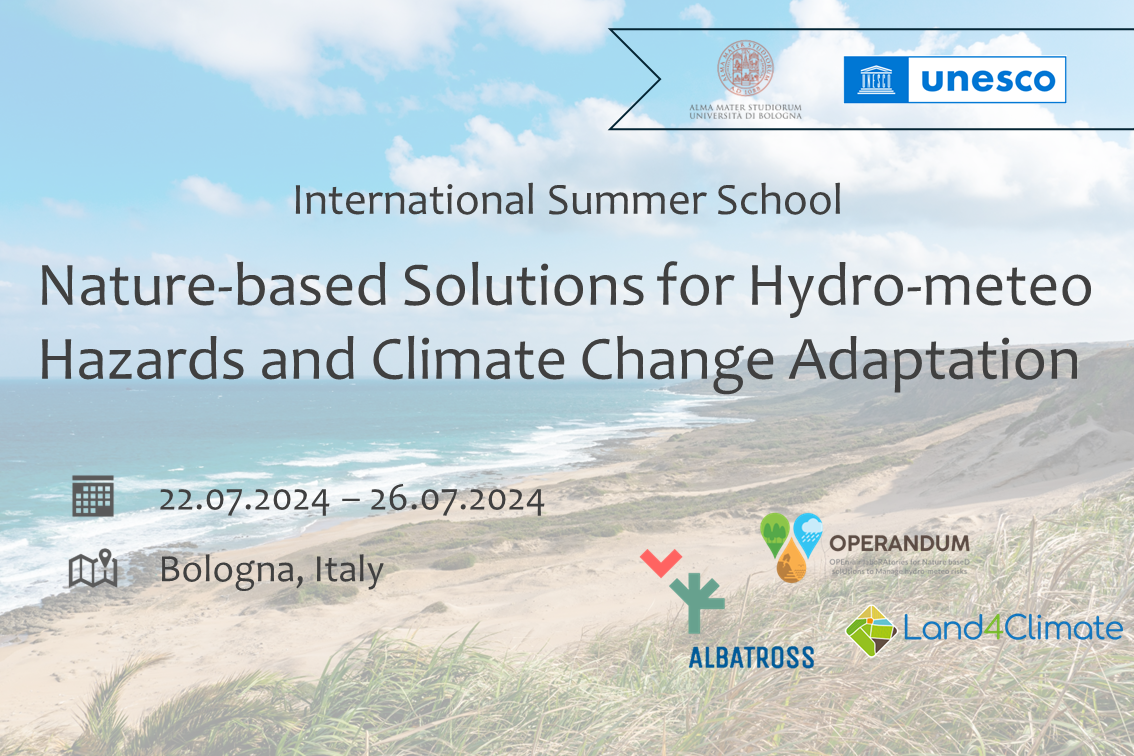Centered around EU-funded projects OPERANDUM, LAND4CLIMATE and ALBATROSS, the Summer School demonstrates the effectiveness of Nature-based Solutions to hydro-meteorological hazards in several co-creation study sites known as Open-Air Laboratories.
- flood | extreme weather | drought | cross-border cooperation | water policy
- Monday 22 July 2024, 09:00 - Friday 26 July 2024, 13:00 (CEST)
- Bologna, Italy
- Country
- Italy
Practical information
- When
- Monday 22 July 2024, 09:00 - Friday 26 July 2024, 13:00 (CEST)
- Where
- Via Irnerio 4640126 Bologna, Italy
- Languages
- English
- Part of
- Website
- Event website
Description

This summer school aims to demonstrate the potential of innovative Nature-based Solutions (NBS) to mitigate the impact of various hydro-meteorological hazards (flooding, erosion, landslides, droughts, etc.) in diverse rural settings, based on the experience gained in several case study sites known as Open-Air Laboratories established within recent EU-founded projects (OPERANDUM, LAND4CLIMATE and ALBATROSS).
Participants will explore the definition and classification of NBS, methodologies for monitoring and modelling the intervention, methodologies for risk assessment in socio-ecological systems, and the process of co-creation. The training program will consist of field visits, lectures from recognized scientists, discussions with local stakeholders, and independent group work on a case site.
In addition, participants will be introduced through field trips to one of the EU Open-Air Laboratory: The Volano Beach, Italy. The course will provide students with a knowledge basis on the rationale for the application of NBS to mitigate hydro-meteo risks, from the co-creation to the implementation and maintenance.
The topics covered by the schools include the definition and classification of NBS, methodologies for monitoring and modelling the intervention, methodologies for risk assessment in socio-ecological systems, and the process of co-creation.
Specifically, this school will cover: NBS concepts and approach; Stakeholder engagement and co-creation in environmental projects; Assessing Risks in Socio-Ecological Systems; NBS selection and engineering; NBS policy context and permitting paths; NBS modelling and monitoring; GeoIKP - NBS platform; Good Practices from OALs. By the end of the school, students will be able to: Understand the rationale of NBS for hydro-meteorological hazards and their benefits; Discuss drivers of hydro-meteorological risks in a changing climate; Select potential NBS for specific hydro-meteorological hazards; Familiarize with modelling and monitoring methodologies to assess the efficacy of NBS; Identify the key elements of the co-creation and replication of NBS (stakeholder engagement strategy, co-design and co-deployment process, dissemination, and replication activities); Work in interdisciplinary projects, address environmental topics using the socio-ecological approach.
